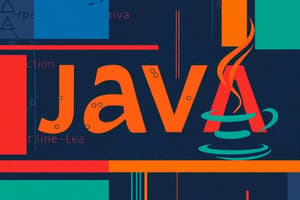Podcast
Questions and Answers
What is the primary goal of modularization in structured programming?
What is the primary goal of modularization in structured programming?
- To reduce code redundancy
- To optimize code performance
- To increase code complexity
- To divide a program into smaller, independent modules (correct)
Which programming paradigm emphasizes the use of pure functions?
Which programming paradigm emphasizes the use of pure functions?
- Object-Oriented Programming (OOP)
- Aspect-Oriented Programming (AOP)
- Functional Programming (correct)
- Structured Programming
What is the primary purpose of event listeners in event-driven programming?
What is the primary purpose of event listeners in event-driven programming?
- To optimize system performance
- To handle user input
- To respond to specific events (correct)
- To log system errors
Inheritance is a key concept in which programming paradigm?
Inheritance is a key concept in which programming paradigm?
What is the primary benefit of using aspects in aspect-oriented programming?
What is the primary benefit of using aspects in aspect-oriented programming?
Which programming paradigm emphasizes the use of hierarchical structures?
Which programming paradigm emphasizes the use of hierarchical structures?
What is the primary difference between object-oriented programming and functional programming?
What is the primary difference between object-oriented programming and functional programming?
What is the purpose of joinpoints in aspect-oriented programming?
What is the purpose of joinpoints in aspect-oriented programming?
Which programming paradigm is characterized by the use of immutable data?
Which programming paradigm is characterized by the use of immutable data?
What is the primary benefit of using polymorphism in object-oriented programming?
What is the primary benefit of using polymorphism in object-oriented programming?
Flashcards are hidden until you start studying
Study Notes
Programming Techniques
Structured Programming
- Uses a top-down approach to break down a program into smaller, manageable modules
- Emphasizes simplicity, clarity, and modularity
- Techniques:
- Modularization: Divide program into smaller, independent modules
- Abstraction: Focus on essential features, ignore non-essential details
- Hierarchical structure: Organize modules in a hierarchical structure
Object-Oriented Programming (OOP)
- Programs organized around objects and classes
- Key concepts:
- Encapsulation: Bundle data and methods that operate on that data
- Inheritance: Create new classes based on existing classes
- Polymorphism: Objects of different classes respond to the same method call
- Abstraction: Focus on essential features, ignore non-essential details
Functional Programming
- Programs composed of pure functions, each with a specific task
- Key concepts:
- Immutable data: Data cannot be changed once created
- Recursion: Functions call themselves to solve problems
- Higher-order functions: Functions that take other functions as arguments or return functions as output
- Closures: Functions with access to their own scope and outer scope
Event-Driven Programming
- Programs respond to events, such as user interactions or network requests
- Key concepts:
- Event listeners: Functions that respond to specific events
- Event handlers: Functions that handle events
- Callbacks: Functions passed as arguments to other functions, executed when a specific event occurs
Aspect-Oriented Programming (AOP)
- Programs modularize cross-cutting concerns, such as error handling and logging
- Key concepts:
- Aspects: Modular units that implement cross-cutting concerns
- Joinpoints: Specific points in a program where aspects can be applied
- Pointcuts: Predicates that determine when aspects are applied
Programming Techniques
Structured Programming
- Uses a top-down approach to break down a program into smaller, manageable modules
- Emphasizes simplicity, clarity, and modularity to improve program structure and maintainability
- Techniques:
- Modularization: Divide program into smaller, independent modules to reduce complexity
- Abstraction: Focus on essential features and ignore non-essential details to enhance program clarity
- Hierarchical structure: Organize modules in a hierarchical structure to facilitate program understanding
Object-Oriented Programming (OOP)
- Organizes programs around objects and classes to model real-world objects and systems
- Key concepts:
- Encapsulation: Bundles data and methods that operate on that data to restrict access and improve data integrity
- Inheritance: Creates new classes based on existing classes to promote code reuse and reduce duplication
- Polymorphism: Enables objects of different classes to respond to the same method call, increasing program flexibility
- Abstraction: Focuses on essential features and ignores non-essential details to enhance program modularity
Functional Programming
- Composes programs from pure functions, each with a specific task to improve program predictability and maintainability
- Key concepts:
- Immutable data: Ensures data cannot be changed once created, reducing side effects and improving program stability
- Recursion: Enables functions to call themselves to solve problems, reducing code complexity
- Higher-order functions: Allows functions to take other functions as arguments or return functions as output, increasing program flexibility
- Closures: Enables functions to access their own scope and outer scope, improving program modularity
Event-Driven Programming
- Programs respond to events, such as user interactions or network requests, to improve program interactivity and responsiveness
- Key concepts:
- Event listeners: Registers functions that respond to specific events, increasing program flexibility
- Event handlers: Defines functions that handle events, improving program responsiveness
- Callbacks: Passes functions as arguments to other functions, executing them when a specific event occurs, enhancing program interactivity
Aspect-Oriented Programming (AOP)
- Modularizes cross-cutting concerns, such as error handling and logging, to improve program modularity and maintainability
- Key concepts:
- Aspects: Implements modular units that address cross-cutting concerns, reducing code duplication
- Joinpoints: Identifies specific points in a program where aspects can be applied, enhancing program flexibility
- Pointcuts: Defines predicates that determine when aspects are applied, improving program customization
Studying That Suits You
Use AI to generate personalized quizzes and flashcards to suit your learning preferences.


![CSC1208: Object Oriented Programming Techniques [JAVA] Lecture 5](https://images.unsplash.com/photo-1503792070985-b4147d061915?crop=entropy&cs=srgb&fm=jpg&ixid=M3w0MjA4MDF8MHwxfHNlYXJjaHw0fHxPYmplY3QlMjBPcmllbnRlZCUyMFByb2dyYW1taW5nJTJDJTIwSmF2YSUyQyUyMENsYXNzZXMlMkMlMjBQcm9ncmFtbWluZ3xlbnwxfDB8fHwxNzExNDU3NDMzfDA&ixlib=rb-4.0.3&q=85&w=300&fit=crop&h=200&q=75&fm=webp)

